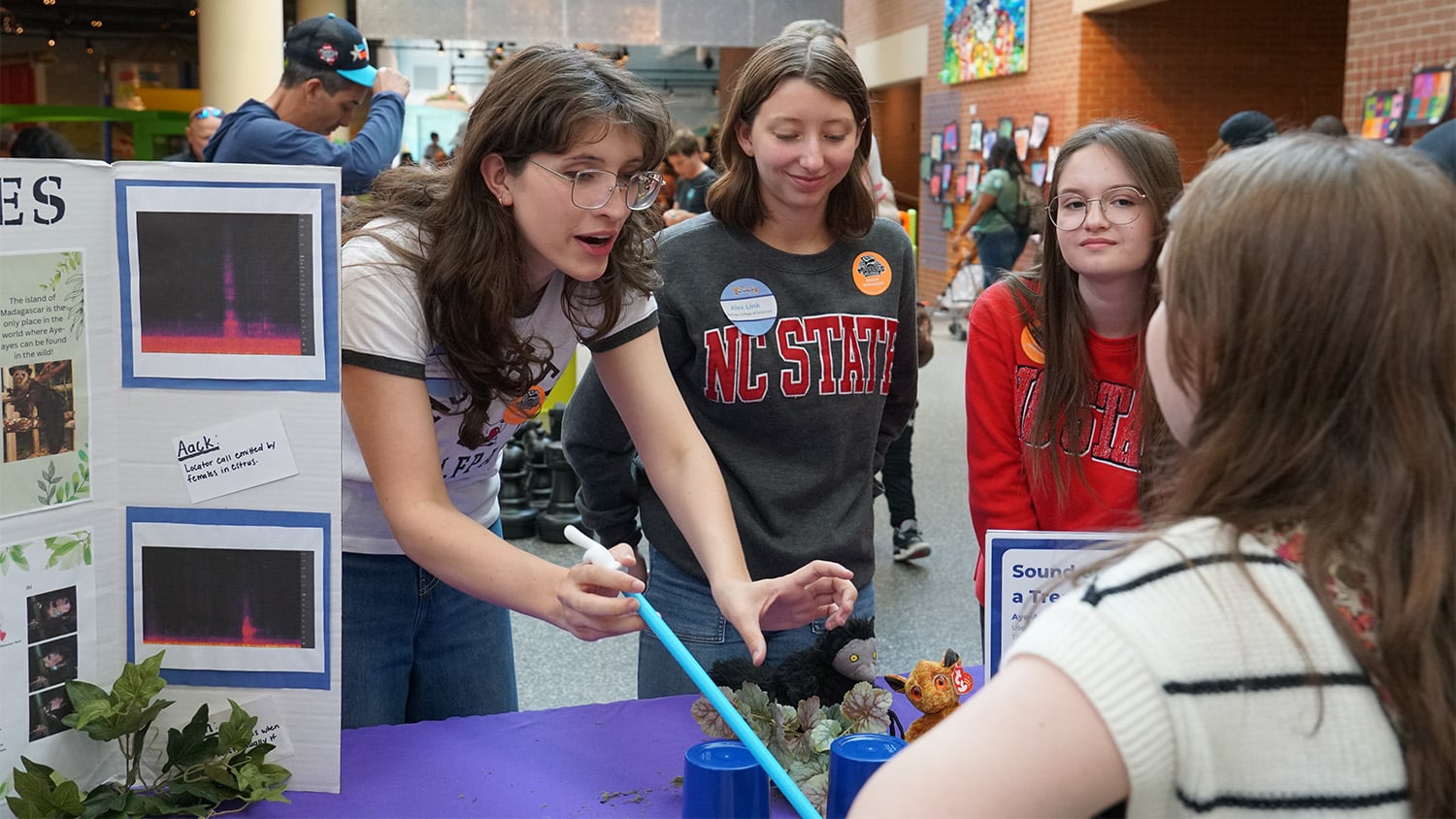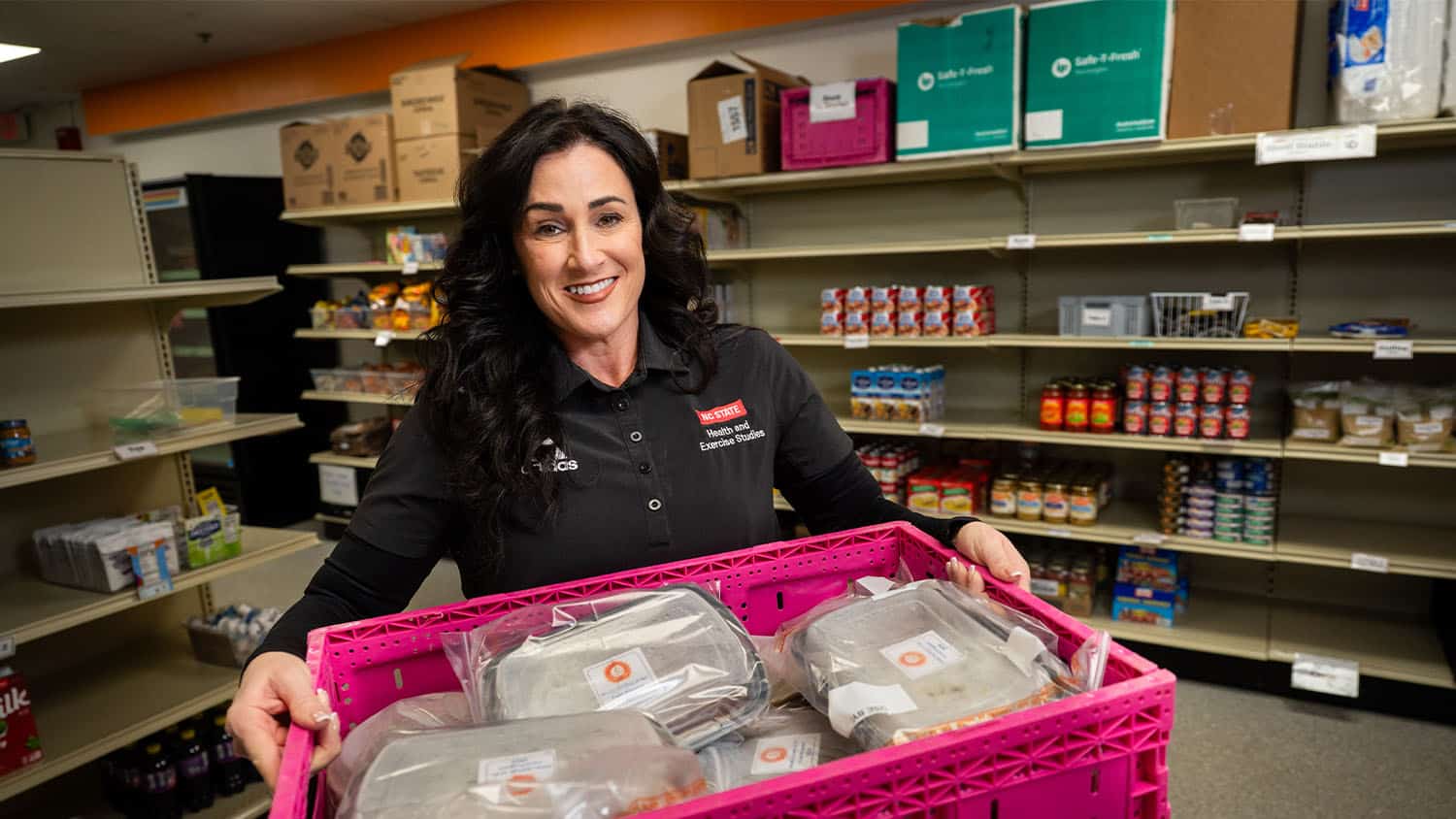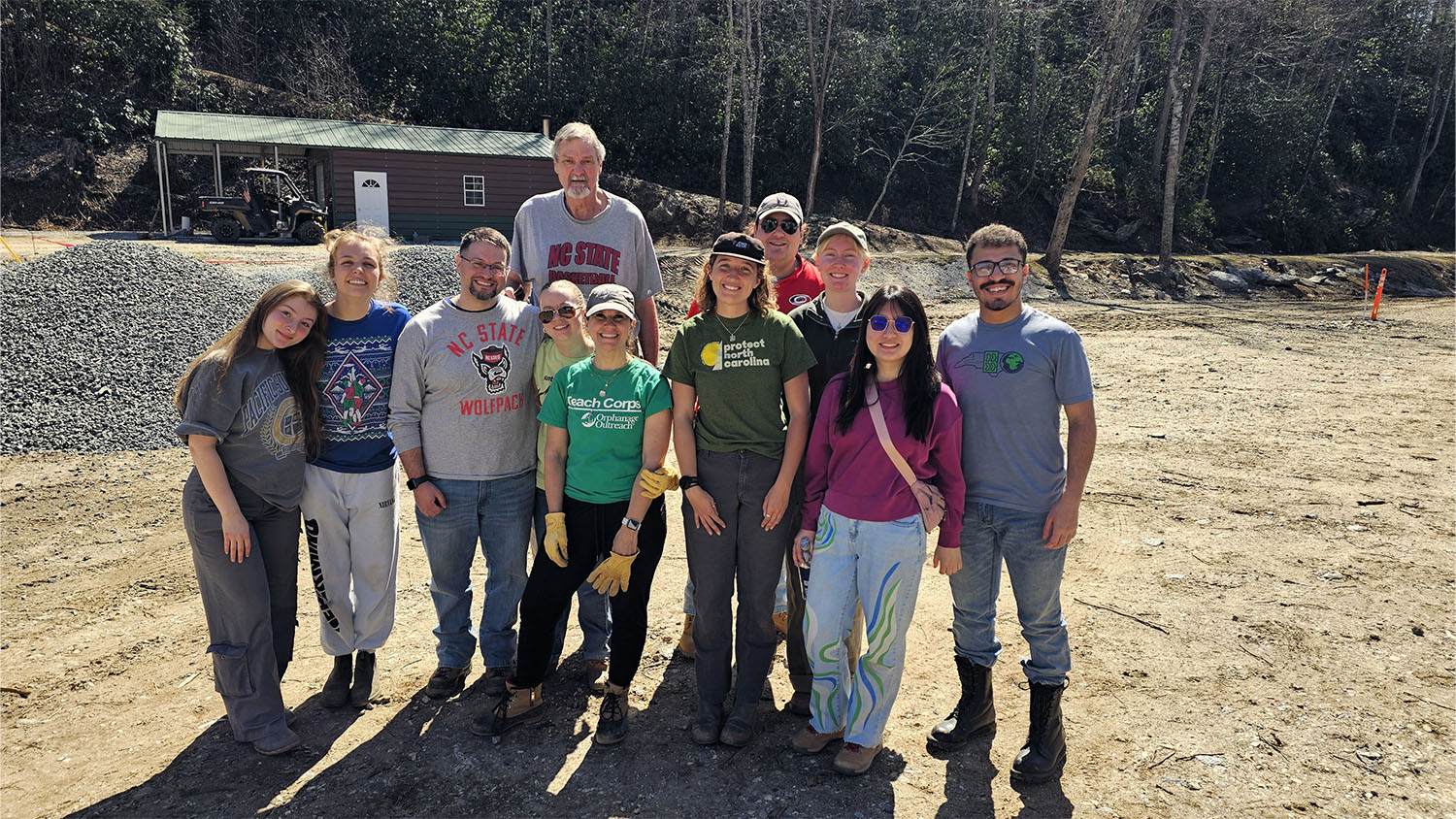Getting a Recovery Foothold in the NC Mountains
In the two weeks since Hurricane Helene swamped the North Carolina mountains, NC State students, faculty, staff and alumni have pitched in to help with recovery and relief. These are their stories.
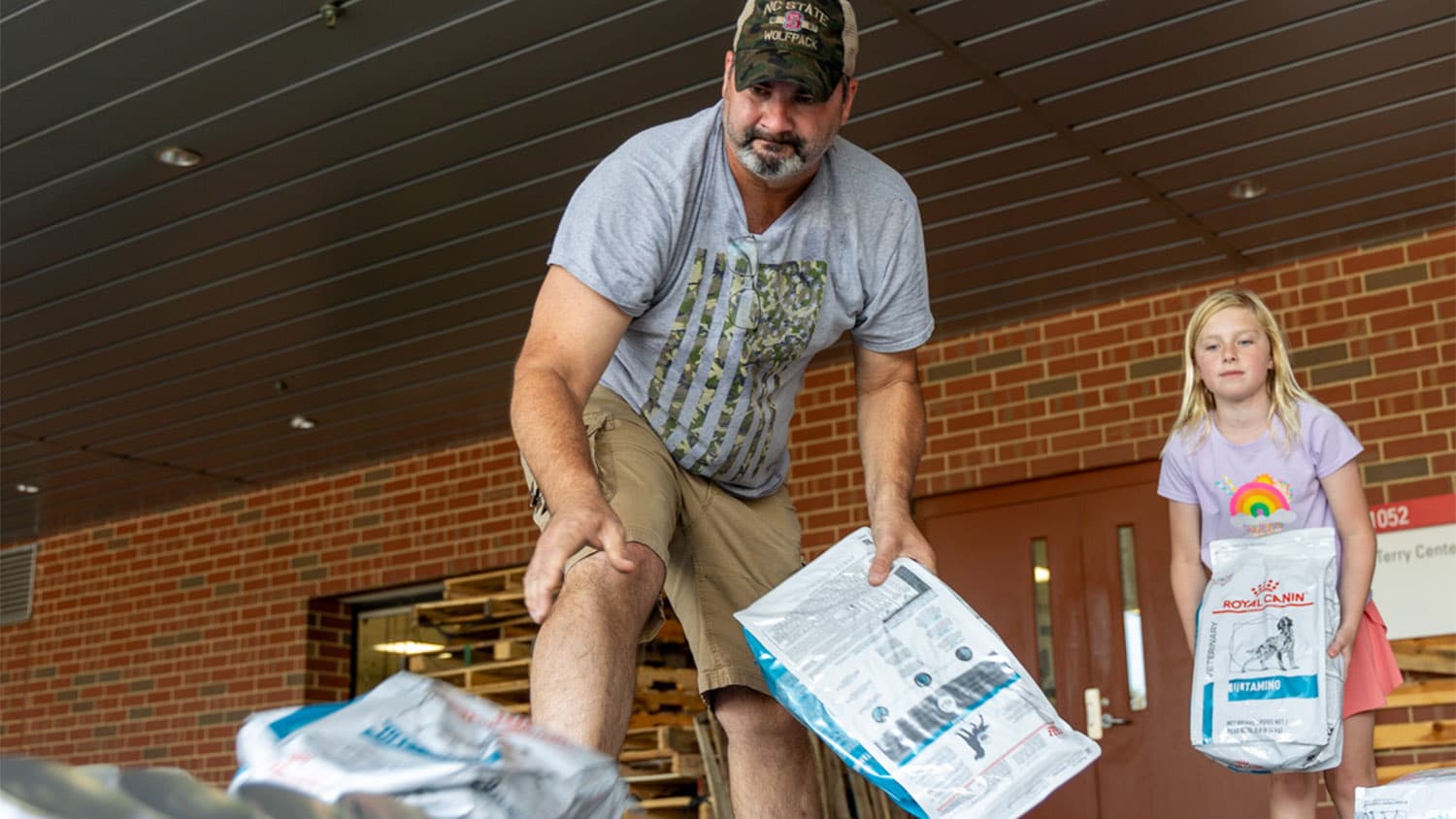
Walking the pregame parking lots of Carter-Finley Stadium last Saturday, there was really only one topic of conversation on a sunny autumn morning, and it wasn’t the NC State-Wake Forest football game, the second most continuous rivalry in college football.
It was Hurricane Helene.
“Are your people OK?”
“Did you have trouble getting out?”
“When can you get back?”
Fans found some respite in tailgating, though it was generally just a bonding opportunity for families to react to stories, coverage and fallout from what will likely be the biggest natural disaster in state history.
From the swollen North Toe to the widened Watauga to the flooded French Broad, rivers and waterways in the mountains were swamped. The storm caused nearly 250 deaths in six states, wreaked untold destruction to buildings and infrastructure and destroyed fall mountain crops like tomatoes, apples and Christmas trees.
In the two weeks since, many have found ways to help, even if they couldn’t hop on Interstate 40 and drive to the areas in most need.
The two schools competing in Saturday’s game came together with their marching bands to offer a little grace and hope to the state with a joint performance of “Amazing Grace.”
NC State has given immediate help to the western part of the state, with pitch-in assistance from students, staff, faculty and alumni. There are multiple efforts to give immediate aid in critical economic sectors like agriculture, manufacturing and tourism through sharing information, creating supply drives to provide lifesaving necessities and simply doing hard work.
North Carolina Cooperative Extension offices in each of the state’s 100 counties and with the Eastern Band of Cherokee Indians have shared information through the North Carolina Disaster Response Center and the Western North Carolina Tourism Response Resources.
There are a multitude of other experiences that have emerged from the families of the 2,700 currently enrolled NC State students from the 25-county disaster area, most of whom won’t have a chance to personally see the destruction until they go home this four-day weekend for fall break.
Here are just a few.
A Rodeo Rider
Jerry Moody, North Carolina Cooperative Extension director for Avery County, has been serving the people in Newland and the surrounding area with their family farms and Christmas tree operations since he was first hired in 1995 after graduating from Clemson.
Since Hurricane Helene hit, however, he’s just trying to make sure everyone is accounted for and fed as the coordinator of food distribution in the region.
The longtime director has been going nonstop for the last two weeks, using generators for power and spotty cell service for communication with the outside world. He’s been gathering food and water for people throughout the county from his wife’s employer, grocery chain Food Lion, and storing hay and feed for livestock in three different donated warehouses.
Everyone thinks someone else has it worse off than they do, so they want us to take [donations] to them instead.
“I went to school to be a horticulturalist, not an emergency operations manager,” Moody says. “You know how people say this isn’t their first rodeo? Well, this is mine. I’ve been thrown off the horse four or five times already.”
But he keeps getting back on to help the people who, in some cases, defer donations to their neighbors.
“Everyone thinks someone else has it worse off than they do, so they want us to take it to them instead,” he says. “We just leave it for them and they eventually use what we give them.”
While he’s doing a job that is not necessarily in his wheelhouse, he is getting it done for the people he serves as Extension director, accepting donations by the pallet- and truck-full, to the point of capacity.
“I’ve seen more Chinook helicopters in the last 10 days than I have in the entire 29 years I’ve been in the mountains,” Moody says. “It’s kind of like herding cats, chickens and giraffes, all at the same time.”
He also did it for an entire weekend without knowing about the safety of his son Bryan Moody, who works at Elk River, on the other side of the mountain from Boone. Jerry Moody, his wife, and Bryan’s wife and newborn didn’t know if Bryan had survived the storm until he showed up at the family home last Monday, having walked 25 miles through the woods.
“It was a stressful time for all of us,” Jerry Moody says.
Taking care of the rest of the county helped keep his mind occupied, and he believes Avery County is also emerging from the woods.
“We’re not in search and rescue anymore,” he says. “We’re starting to be more in recovery mode. We will start working with the Department of Transportation and Mountain Electric [Cooperative] and Duke Energy about restoring power and roads.”
And there’s plenty of food from charity organizations, local companies and federal agencies that have brought in food trucks and mobile kitchens to prepare, serve and deliver it.
“We have some people who have told us they are eating better than they ever did before the storm,” he says. “We just have to keep it up.”
A Flatlander’s Helping Hand
Like so many removed from Helene’s direct destruction, NC State senior biomedical engineering student Caitlyn Williams wanted to find a way to help those in need in western North Carolina. As it happens, the native of Louisburg in Franklin County is the daughter of her hometown’s assistant fire chief, David Williams.
The nearby Youngsville fire station is a primary site for NC211, a statewide health and human services organization run by the United Way that helps those in need find resources. Since 2015, NC211 has provided those resources in each of North Carolina’s 100 counties and fields more than 170,000 calls annually.
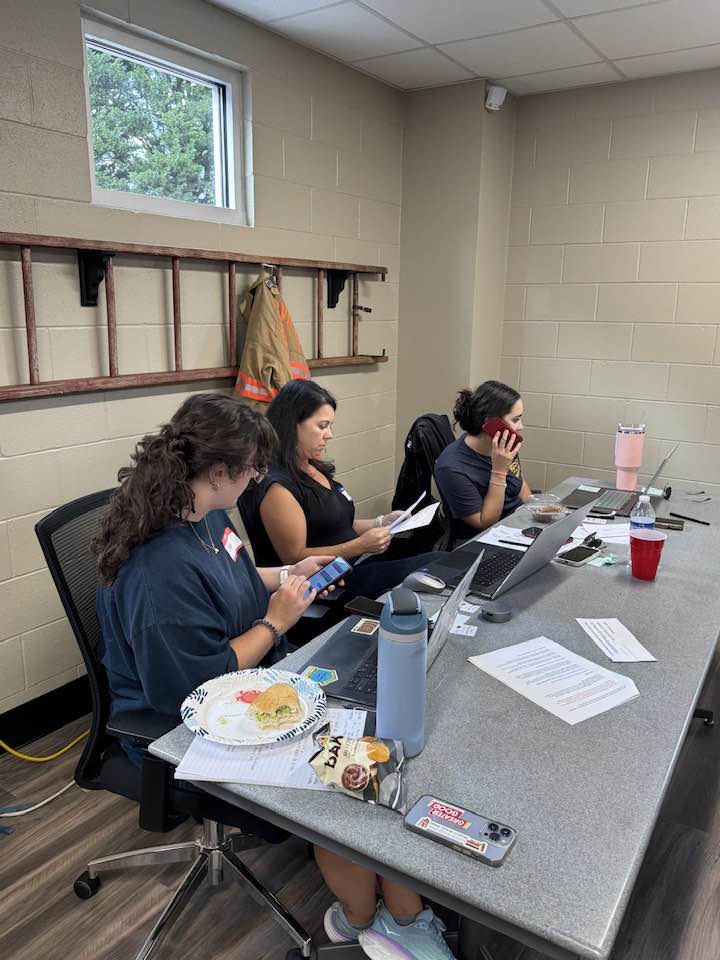
When Helene hit, calls surged at the call centers, which are operated by volunteers 24/7, 52 weeks a year. And more volunteers were needed.
Despite her heavy class load, Caitlyn Williams has devoted more than 90 hours to taking calls at the fire station and training others to do the same, matching those in the mountains who are desperately seeking services to relief organizations that can provide them.
“I just wanted to be able to help people in some way with this horrible disaster,” Williams says. “My dad told me they needed more volunteers. I’ve been doing everything from calling people who have filled out NC211 forms for their loved ones to training new volunteers and answering questions.”
She’s been on the line with a family that was joyously reunited with their daughter after days of searching, and she’s had to hear about families who have lost family members and all their belongings. She’s trained to handle such situations, but it’s not exactly part of her curriculum in regenerative engineering and pharmacoengineering.
She’s just happy to be part of a community effort that is more than 200 miles away from the worst damage.
“It’s amazing to see so many people show up from our community who were just ready and eager to help,” she says. “From our center alone, we have had 25 to 30 volunteers for each shift, with four shifts every day.”
A Family Contribution
Barbara and Phil Rucker live in the Madison County town of Mars Hill. The two NC State graduates (Barbara in materials science and engineering, Phil in chemical engineering and textile science) made it through the storm without much damage, which gave them the opportunity to volunteer through local relief agencies.
With access to cellular service and mobile data, Barbara has shared her photos of working at the Marshall campus of Asheville-Buncombe Technical Community College, which transitioned from a local distribution site to a FEMA-controlled administrative site, and at Mountain Grace Baptist Church.
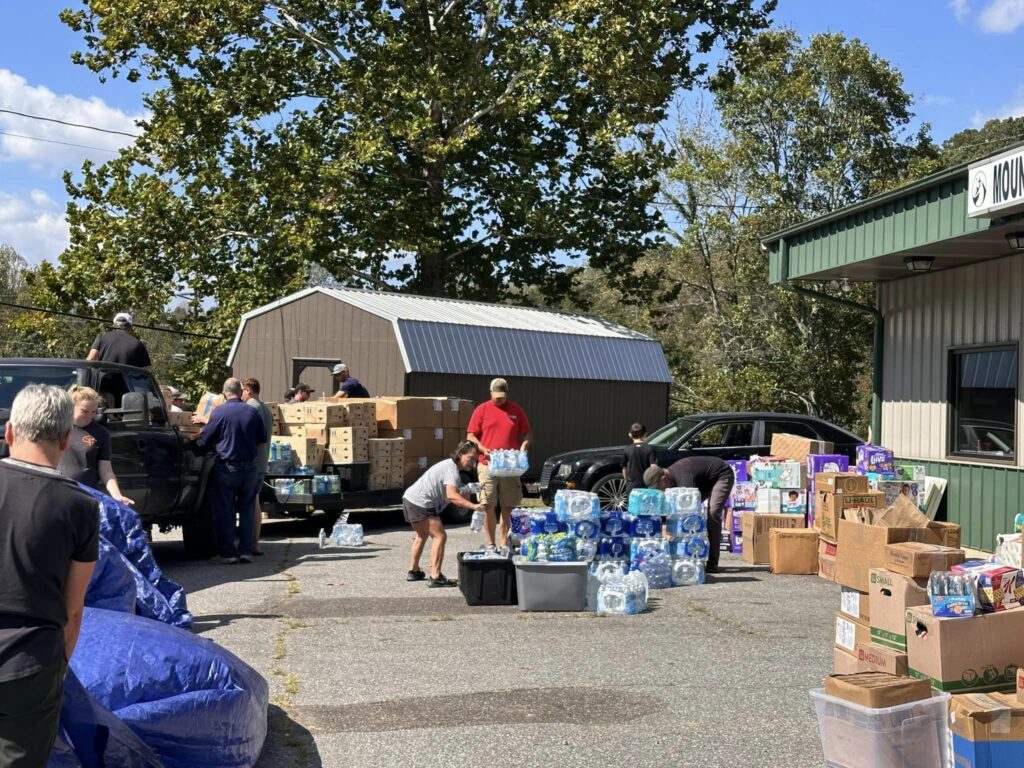
Theirs is the experience of thousands of families in the mountains who have become recovery and delivery specialists for friends and neighbors without food, electricity and basic shelter.
Barbara’s on-the-ground suggestions for sending goods to neighbors include Benadryl for the disaster-relief workers encountering yellow jackets as they remove debris, and a reminder that cats need food, too. Dog food donations were outpacing cat food 15-to-1.
Preparing Meals With a Coastal Influence
Karen Oglesby Long (Business Management, ’87) lives in Morehead City and really couldn’t have been farther from the effects of Hurricane Helene while still in the Old North State. As a resident of North Carolina’s Crystal Coast, however, the senior vice president and director of business systems for First Citizens Bank has seen her share of storm damage since moving to Carteret County in 2017.
She, husband Alan and her mother evacuated from there when Florence hit in 2018, which destroyed her mother’s home in Beaufort.
Last week, Long was supposed to be traveling to Boone for a riverside vacation to enjoy the changing autumn leaves. Helene changed those plans, and she spent the week volunteering with the rescue and recovery team from Baptists on Mission Disaster Relief Ministry in the Buncombe County community of Arden, just south of Asheville. Her son David, a state probation officer, was working in nearby Marion at a medical facility checkpoint.
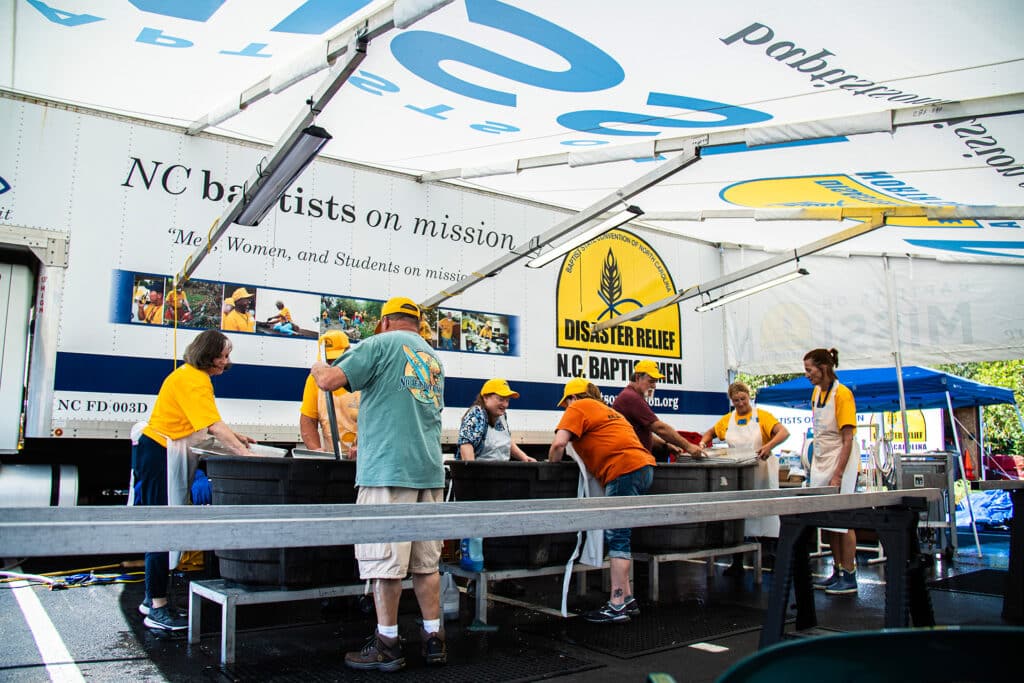
She worked 18 hours a day preparing and delivering meals to those in need before returning to the coast this week.
“I literally feel like I just left a war zone,” she says. “It’s just hard to describe.”
How You Can Help
Chancellor Woodson sent a message of support for those affected by the flood last week that included several resources and ways to help. Below are additional ways to donate or provide financial assistance to those affected. Please note that this list is not exhaustive and is subject to change as the situation in western North Carolina develops.
Donate Items at NC State and Across the Triangle
- There is a drop-off location at the Student Government suite at 4251 Talley Student Union.
- There is a drop-off location at 3002 Engineering Building III.
- Triangle Mutual Aid has a list of needed items and offers several drop-off locations around the Raleigh and Durham areas.
Donate to Relief Funds
- NC State Extension Disaster Relief Fund is helping Extension staff on the ground in western North Carolina as they bring resources and supplies to residents.
- North Carolina Disaster Relief Fund
- Hurricane Helene North Carolina Community College Response and Recovery Fund
- VetMed Disaster Relief Fund is helping the College of Veterinary Medicine deliver pet supplies to impacted communities.
Support College Students and Their Families
- NC State Student Emergency Fund assists NC State students from western North Carolina with financial needs as they arise.
- Mountaineer Emergency Fund (Appalachian State University)
- UNC Asheville Helene Disaster Relief
- Western Carolina University Student Affairs Disaster Relief
- Categories:
